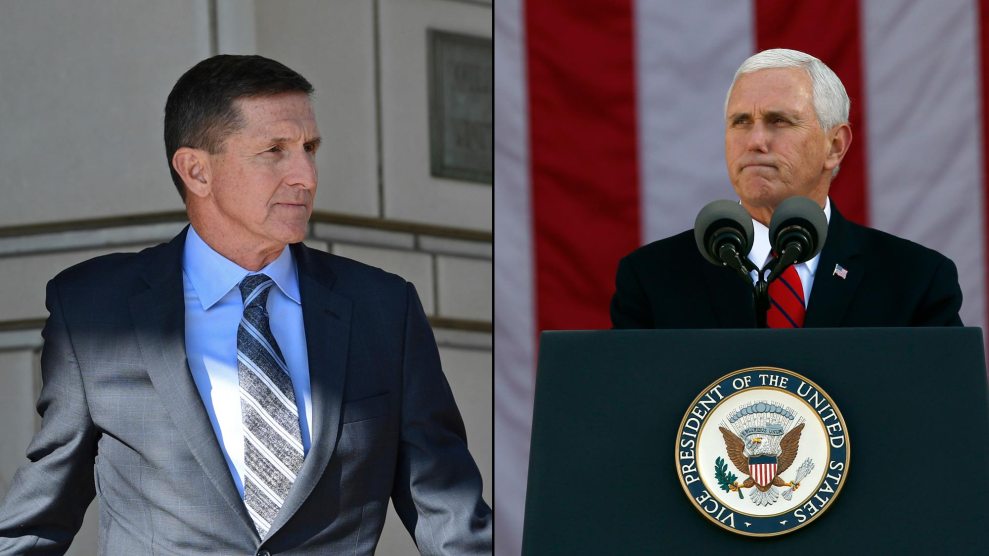
Flynn: Susan Walsh/AP; Pence: Alex Brandon/AP
When special counsel Robert Mueller announced a criminal charge against retired Gen. Michael Flynn, President Donald Trump’s former national security adviser, it was far more than an embarrassment for the White House. The “statement of offense” that accompanied Flynn’s charge for lying to the FBI implicates other senior Trump aides in a cover-up of Flynn’s lies—and spells trouble especially for Vice President Mike Pence.
On January 12, Washington Post columnist David Ignatius broke the news that Flynn had spoken the previous month with Russian ambassador Sergey Kislyak on the day that President Barack Obama imposed sanctions on Moscow for meddling in the 2016 election. Ignatius did not report what the two had discussed. But he raised the possibility that Flynn had brought up the sanctions and tried to undercut the Obama administration.
Three days later, Vice President-elect Mike Pence went on Face the Nation and addressed whether Flynn had discussed these sanctions during his conversations with Kislyak. Host John Dickerson queried Pence explicitly about Ignatius’ column. The following exchange occurred:
MIKE PENCE: I talked to General Flynn about that conversation…He had sent a text to the Russian ambassador to express not only Christmas wishes but sympathy for the loss of life in the airplane crash that took place. It was strictly coincidental that they had a conversation. They did not discuss anything having to do with the United States’ decision to expel diplomats or impose censure against Russia.
JOHN DICKERSON: So did they ever have a conversation about sanctions ever on those days or any other day?
MIKE PENCE: They did not have a discussion contemporaneous with US actions…But what I can confirm, having spoken to him about it, is that those conversations that happened to occur around the time that the United States took action to expel diplomats had nothing whatsoever to do with those sanctions.
According to Mueller’s indictment, Pence’s statement was false. Flynn indeed had talked about Obama’s sanctions with Kislyak, and Flynn had asked Russia to moderate its response. In other words, he had intervened in US foreign policy and undercut the outgoing administration.
Weeks after Pence’s appearance on Face the Nation—and following news reports that Flynn and Kislyak had spoken about the sanctions—the White House maintained that Pence had gotten this wrong because Flynn had misled him. And that deception, the White House said, was the reason Trump was booting Flynn from his job.
Yet the statement of offense undermines Pence’s initial remark about the Flynn-Kislyak conversation and raises big questions about whether Pence and other top Trump aides hid the truth about Flynn’s interaction with the Russian.
According to the document, Flynn was first contacted by Kislyak about the sanctions on December 28, 2016. The next day, Flynn called “a senior official of the Presidential Transition Team” who was with other high-level Trump officials at Trump’s Mar-a-Lago estate in Florida. On the call, Flynn and this senior Trump official talked about what he should tell Kislyak. Flynn and the Trump official “discussed that members of the Presidential Transition Team at Mar-a-Lago did not want Russia to escalate the situation.” Flynn immediately called Kislyak and “requested that Russia not escalate the situation” and instead respond reciprocally. Flynn then called the senior transition official back to summarize his conversation with Kislyak.
On December 31, Kislyak called Flynn to tell him that Russia, as President Vladimir Putin had said the day before, would not retaliate. Flynn, according to the document, then spoke with “senior members” of the Trump transition team about his “conversations with the Russian Ambassador regarding the U.S. sanctions and Russia’s decision not to escalate the situation.”
This means that Flynn’s interactions with Kislyak were not freelance activities and that the top echelon of the Trump transition team was fully aware of these communications. The statement of offense does not name the senior Trump aides whom Flynn communicated with about this matter. (It’s possible that Trump or Pence was part of this group.) But it does indicate that top-ranking Trump officials knew that Pence’s statement on Face the Nation was false. And yet the White House allowed it to stand until news reports disclosed the true content of these communications between Flynn and Kislyak.
Mueller’s statement puts Pence on the hot seat. Was he really unaware of what “senior members” of the transition team were told about Flynn’s conversation with Kislyak? After all, at that time, Pence was the head of the transition team. A spokeswoman for Pence did not immediately respond to a request for comment.
The bottom line is that Pence, as vice-president elect, made remarks that concealed a questionable Flynn interaction with Russia that was actually approved by the transition team that Pence himself was in charge of. The question now is: Was Pence a witting participant in this plot? And if not, who are the senior Trump aides named in the Mueller document who allowed this cover-up to occur?















